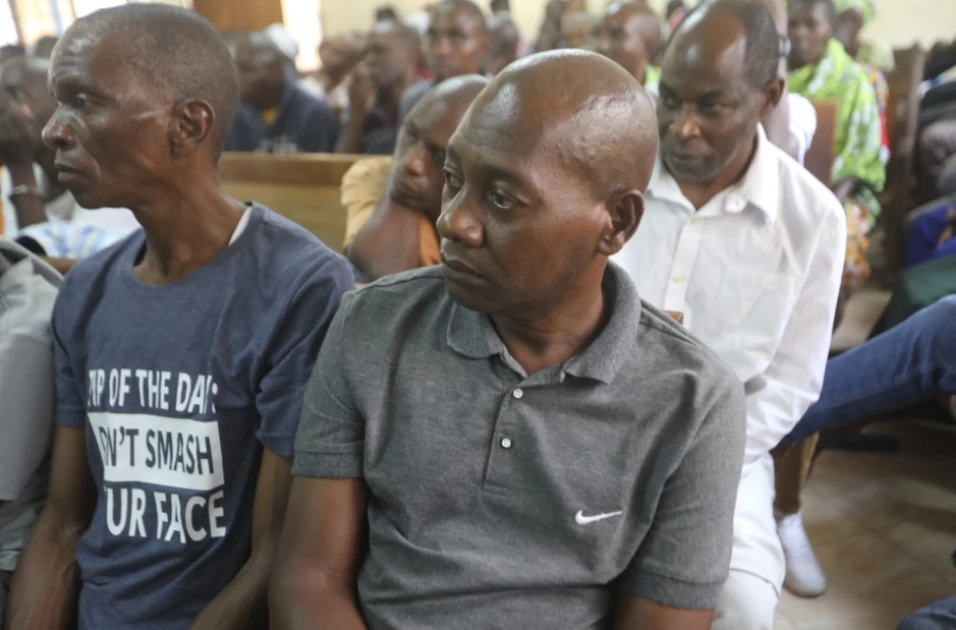Mackenzie secretly ate in police custody while followers starved for ‘divine intervention’ - Witness

Controversial preacher Paul Mackenzie and his co-accused persons appear before the Shanzu Law Courts on October 29, 2025. PHOTO | COURTESY | ODPP

Audio By Vocalize
Controversial preacher Paul Mackenzie secretly ate while in police custody even as his diehard followers continued fasting, convinced their hunger strike would deliver them from criminal charges, a police witness has told the court.
Testifying before Principal
Magistrate Leah Juma at the Shanzu Law Courts, Assistant
Superintendent of Police (ASP) Noor Abdi, the former Officer Commanding
Malindi Police Station, said Mackenzie and several of his co-accused were
detained at the station between June 6 and June 14, 2023.
During that period, Abdi said, at
least 15
suspects refused to eat for eight consecutive days, insisting
their fasting was a spiritual act meant to secure “divine intervention” in
their legal troubles.
“We separated Mackenzie from the
rest of the suspects, and our informer reported that Mackenzie ate while in the
cell but did it secretly, so that his followers would not notice,” Abdi
testified.
The officer said the detainees
became dangerously weak during the hunger strike and declined medical
assistance even when taken to hospital, maintaining that they were fasting for
spiritual reasons.
Abdi also tabled communication records sent to senior
commanders reporting the mass refusal of food among the detained Shakahola
cult followers.
According to the Office
of the Director of Public Prosecutions (ODPP), the testimony
forms part of a detailed account presented in court as the prosecution
continues to lay out its case against Mackenzie and his 92 co-accused, all
facing multiple counts under the Prevention of Terrorism Act and
the Prevention
of Organised Crime Act.
The prosecution also produced Alex
Tsofia, an excavator operator who testified that he had been
contracted by Mackenzie to construct a dam in Shakahola, Kilifi County,
where the alleged cult operated. He told the court he worked at the site for
two weeks.
Supporting his testimony, Engineer Fredrick Ako
from the National
Water Harvesting and Storage Authority presented a report
showing that the dam was not designed for irrigation but as a water
harvesting pan with a storage capacity of 18,851.6
cubic metres — enough to serve about 218 households
or 1,090
people for an entire year.
A subsequent inspection by the
Authority found no evidence of irrigation or livestock use,
concluding the excavation was purely a water catchment project.
The report, however, estimated that depending on rainfall and
consumption, the structure could serve up to 16,498 people
for three months.
The court also heard an emotional
testimony from Stephen Mwiti, a man whose family was destroyed
after his wife became one of Mackenzie’s followers.
“I sometimes walked around with
the TV remote in my pocket to stop her from watching Mackenzie’s preaching, but
it didn’t help,” Mwiti recounted.
He said his wife later fled their
home with their five children while pregnant with their sixth, joining the
Shakahola settlement.
“When I heard some people had
been rescued from Shakahola, I prayed I would reunite with my family. But I was
devastated when I learned that my wife and all six children, including a
one-month-old baby, had disappeared,” he told the court tearfully.
A DNA test later confirmed that
one of the rescued children was indeed his. When questioned by Mackenzie’s
lawyer on whether he would reconcile with his wife, Mwiti said he had left the
matter to the court and only wanted justice.
“The case, which has
gripped national attention, continues to expose harrowing details about the
alleged cult activities in Shakahola, where hundreds of followers are believed
to have died through starvation and indoctrination,” the ODPP noted.


Leave a Comment